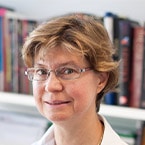
Scientific Areas of Expertise: Breast Cancer, Cancer Cells of Origin, Genomics, Stem Cell Biology
For eminent contributions to the fields of breast cancer research and breast stem cell biology, including the seminal discovery of breast stem cells that give rise to normal breast tissue and the identification of specific breast cell populations that exhibit a predisposition to cancer in women harboring BRCA1 gene mutations.
Dr. Visvader is recognized for seminal contributions to breast stem cell biology and the cellular origins of breast cancer. In a landmark discovery in 2006, together with Dr. Lindeman and their team, she identified breast stem cells and provided the first demonstration that an epithelial tissue could be regenerated from a single stem cell. Her team subsequently identified progenitor cells and helped define breast development from long-lived stem cells to daughter progenitors and mature ductal cells. The 3D imaging of intact breast tissue has further enabled the in situ tracking of stem and progenitor cells during normal development and breast cancer progression and led to the identification of dormant breast stem cells.
Her research on the hierarchy and identification of master regulators of mammary gland development has provided a critical framework for further efforts to dissect the epithelial hierarchy and understand molecular and cellular events that give rise to breast cancer. Building on these studies, her group made the unexpected discovery that despite lacking receptors for hormone receptors, mammary stem cells were exquisitely sensitive to female hormones. These findings help explain how sustained exposure to hormones increases the risk of breast cancer.
Notably, Dr Visvader’s research has helped define the relationships between normal and cancerous cells and identify potential ‘cells of origin’ of breast cancer. In a paradigm shift, with Dr Lindeman and team, she discovered that luminal progenitor cells and not breast stem cells (as had been long assumed) are the likely transformation target in women who carry a BRCA1 mutation. Through gene profiling studies, she revealed striking molecular similarities between luminal progenitors and aggressive ‘basal-like’ tumours. Further work led to the identification of the RANK receptor as a bona fide target for breast cancer prevention in BRCA1 mutation carriers, culminating in an international prevention clinical trial.
Selected Honors and Awards
2020 Elected Fellow, The Royal Society, London, United Kingdom
2019 Brinker Award for Scientific Distinction in Basic Research, Susan G. Komen for the Cure, Dallas, Texas (joint award)
2017 The Victoria Prize for Science and Innovation in the Life Sciences, Veski Foundation, Melbourne, Australia (joint award)
2016 The Lemberg Medal, Australian Society for Biochemistry and Molecular Biology, Canberra, Australia
2016 National Health and Medical Research Council Elizabeth Blackburn Fellowship, Australian Government
2016 Elected Fellow, Australian Academy of Health and Medical Sciences, Australia
2016 Ramaciotti Medal for Excellence in Biomedical Research, Sydney (joint award)
2015 Clifford Prize for Cancer Research, Centre for Cancer Biology, Adelaide, Australia
2014 Medal for Excellence in Scientific Research, The Royal Society of Victoria, Melbourne
2013 Patron’s Award, Innovation and Vision in Research, National Breast Cancer Foundation, Frisco, Texas
2012 Fellow, Australian Academy of Science, Canberra, Australia